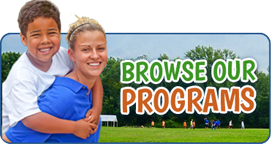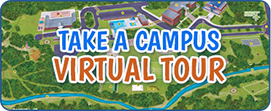Learning about and riding horses is not an every day opportunity during the year. But at Congressional Camp in Falls Church, Virginia, campers have the chance to do just that!
Every summer, campers grow more confident, discover new talents, and pursue new passions in our exciting and engaging Equestrian Program.
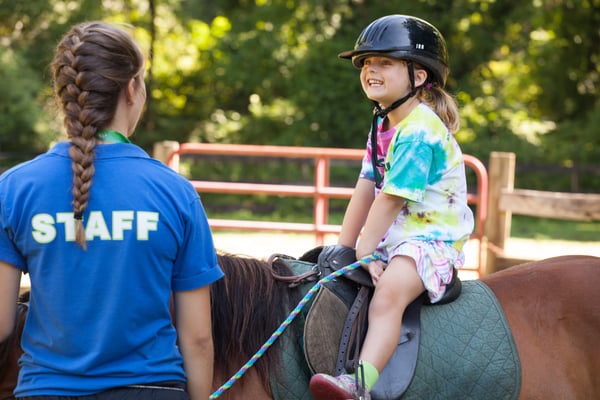
Our equestrian program is more than a series of lessons on how to ride. It’s a complete introduction to working with new four-legged friends, with plenty of time in the saddle! During Day Camp sessions and specialty camps like Pony Adventures, campers learn the skills needed to be safe around horses, how to groom them, and various lessons on horse breeds and history.
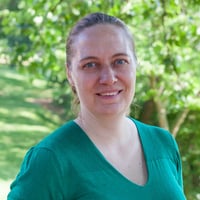 Laura Short, Assistant Director of Auxiliary Programs at Congressional School, sat down to describe what makes the Equestrian Program so special. Check out her interview here:
Laura Short, Assistant Director of Auxiliary Programs at Congressional School, sat down to describe what makes the Equestrian Program so special. Check out her interview here:
What is the primary focus of Congo Camp's Equestrian Program?
Our goal is to grow confident equestrians in a safe, fun, rider‐centered environment. Congressional helps students grow riding skills from beginner through intermediate levels, gain horsemanship knowledge, and develop friendships with two and four‐legged friends.
We believe working with horses builds on the core values of integrity, kindness, perseverance, respect, and responsibility. We want to expose kids to the world of riding in a safe and fun way.
What are the different ways that campers interact with horses over the summer?
We have a couple of different ways that we work with horses during the summer. The best example is Pony Adventures, a specialty camp that focuses entirely on campers spending time with the horses. At the beginning of the session, kids are assigned a horse “buddy” and a camper buddy for the week. The two campers assume all responsibility for their horse. They feed, groom, clean up after, and ride their horse every single day. When they aren’t in the barn or in the saddle, they learn about all aspects of horsemanship and equine care, from bathing horses, to horse communication, to equine first-aid.
We’ve restructured Pony Adventures from years past. This summer, there will be smaller group sizes working with the horses, more time in the saddle, and a sense of ownership of an individual horse (rather than riding different ones each day). We are very excited about the changes!
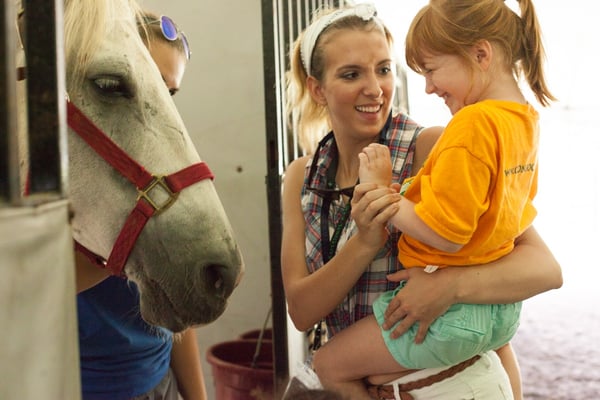
Primary campers enrolled in Day Camp (1-2nd graders) and those in Great Adventures (4-5 year-olds) take pony rides every other day. We want as many campers as possible to gain exposure to horses. Riding a horse boosts confidence, builds empathy, helps campers face fears, and is a lot of fun! We also have special mini-ponies that are the perfect size for our smallest riders to take their very first ride.
Last, but not least, day campers that want more time in the saddle can sign up for supplemental horse lessons. They’ll get some one-on-one time with an instructor in the saddle each week. This is a great way to build skills throughout the summer.
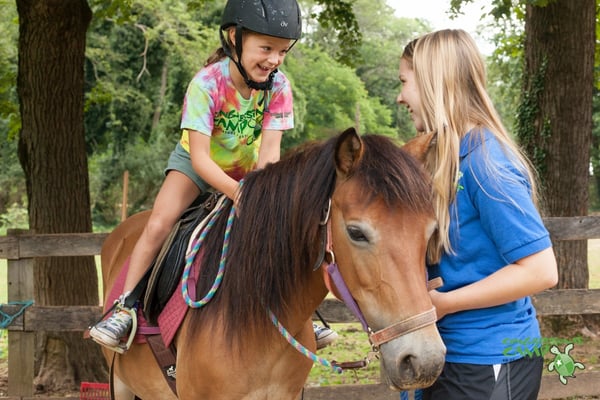
How is the horses program designed to help campers learn and grow?
Horses are big, unpredictable, and a lot of fun. When our campers learn to work with horses, we see them face fears. Our horses can weigh up to one ton and be taller than our campers. Even walking on the ground around a horse’s legs can be nerve-wracking. As our campers learn to be around horses, interact with horses, and ride horses, we see their confidence grow immensely.
Horses also have unique personalities and temperaments. We see campers develop special bonds in order to successfully work with a horse or pony. Kids practice empathy, verbal communication, and non-verbal communication. They also practice important team-building skills with their fellow riders as they work together to care for the animals out of the saddle.
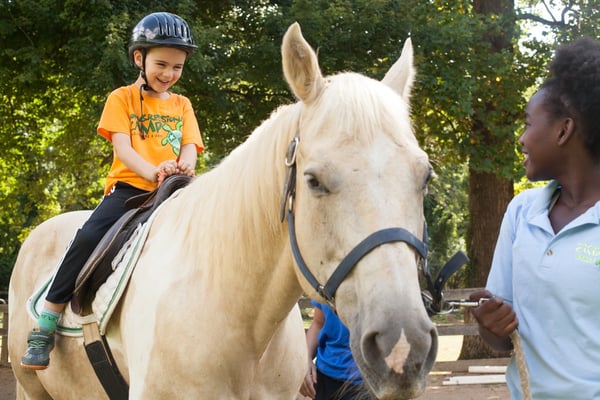
What makes horses unique from other camp activities?
Horses are alive! It’s the only activity at camp where the activity can actually engage with participating campers, but also have a mind of their own. Imagine an archery arrow stopping mid-flight to try to take a drink of water or a soccer ball leaving a game to try to play with another soccer ball. Anyone that owns a pet can understand how amazing it is to work with animals, and how unique each animal experience can be!
What do the horses do in the offseason?
Half of our herd stays at the Congressional School for 2 months before and after camp, enabling Congressional students to take riding lessons after school. The Congressional Riding Academy serves riders of all skill levels from Kindergarten to 8th grade. Occasionally, we open registration to camp families as well!
During the winter the entire herd visits Luray, Virginia for a well-deserved winter vacation. They have free range on large grass pastures where they play, eat, and relax until the next riding season begins.
What is the most important thing for campers to take away from working with animals?
I think lots of people have different ideas of what’s most important to take away from working with the Congressional horses. For me, I hope our riders have the chance to develop their ideas of respect. Over a summer spent down by the barn, campers learn to respect their horse, listen to it, care for it, and be considerate of their horses’ needs. They also learn to respect the riding program by assuming responsibility and caring for equipment like saddles. Through their lessons, campers also develop strong relationships with their instructors and an awareness of natural elements that impact them while they’re riding.
Most importantly, riders learn to respect themselves. They learn to be confident, trust their relationship with their horse, and listen to how their body works. In many ways, riding is about expanding your awareness beyond yourself, and learning to respect the things around us that impact how we move through life.
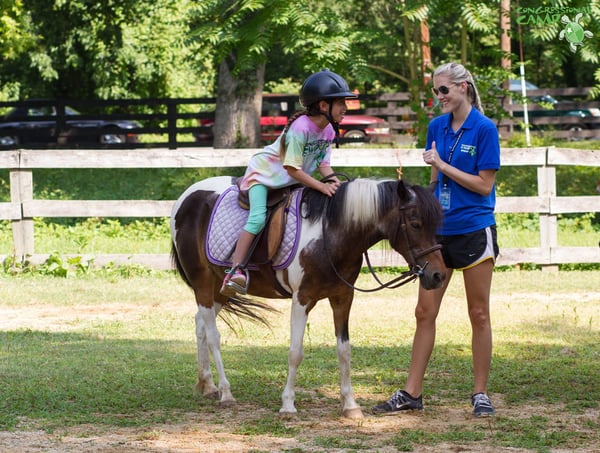
When did you begin working with horses?
As a child growing up in Texas, I had several opportunities to take epic trail rides when I was little. My first “real” riding experience was a riding day camp that I attended when I was in 6th grade. I won the Golden Shovel award for the best poop-scooping! After that, I was hooked.
I took lessons throughout middle school, high school, and college. After college I taught horseback riding at summer camps. For many years, I was the riding director of a summer camp in Vermont where I supervised several staff and about a dozen horses. We’d teach lessons, care for the horses, and go on trail rides. We’d even lead a horse-back riding overnight trip where we’d take the horses swimming and camp in a field in the mountains with horses running all around us.
What is your favorite thing about working at the barn?
I love horse people! No matter your age, the people that choose to spend their time around horses are pretty special people. I love sharing my passion with others who are just as passionate as me.
What have Congressional campers taught you about the program?
At Congressional, I am reminded of how important horses can be for people. So many of our campers have their first experience with horses at our barn. Congressional is located in an urban area, which means that campers might not be able to get up close and personal with any kind of animal, much less one so large. The change that I see in campers after their first ride, or how excited they are to visit the horses, shows me that our herd is providing an essentially important experience. There’s something about animals that make humans better people. I’m reminded about that all the time during the summer in the barn.

What are you most looking forward to in summer 2018?
I am so excited to see what our camp families think about our new and improved Pony Adventures! I think it’ll be a great camp, and I hope that they agree. Campers can also look forward to seeing some new fuzzy faces in the herd. We’ll have two or three new friends joining us this summer.


